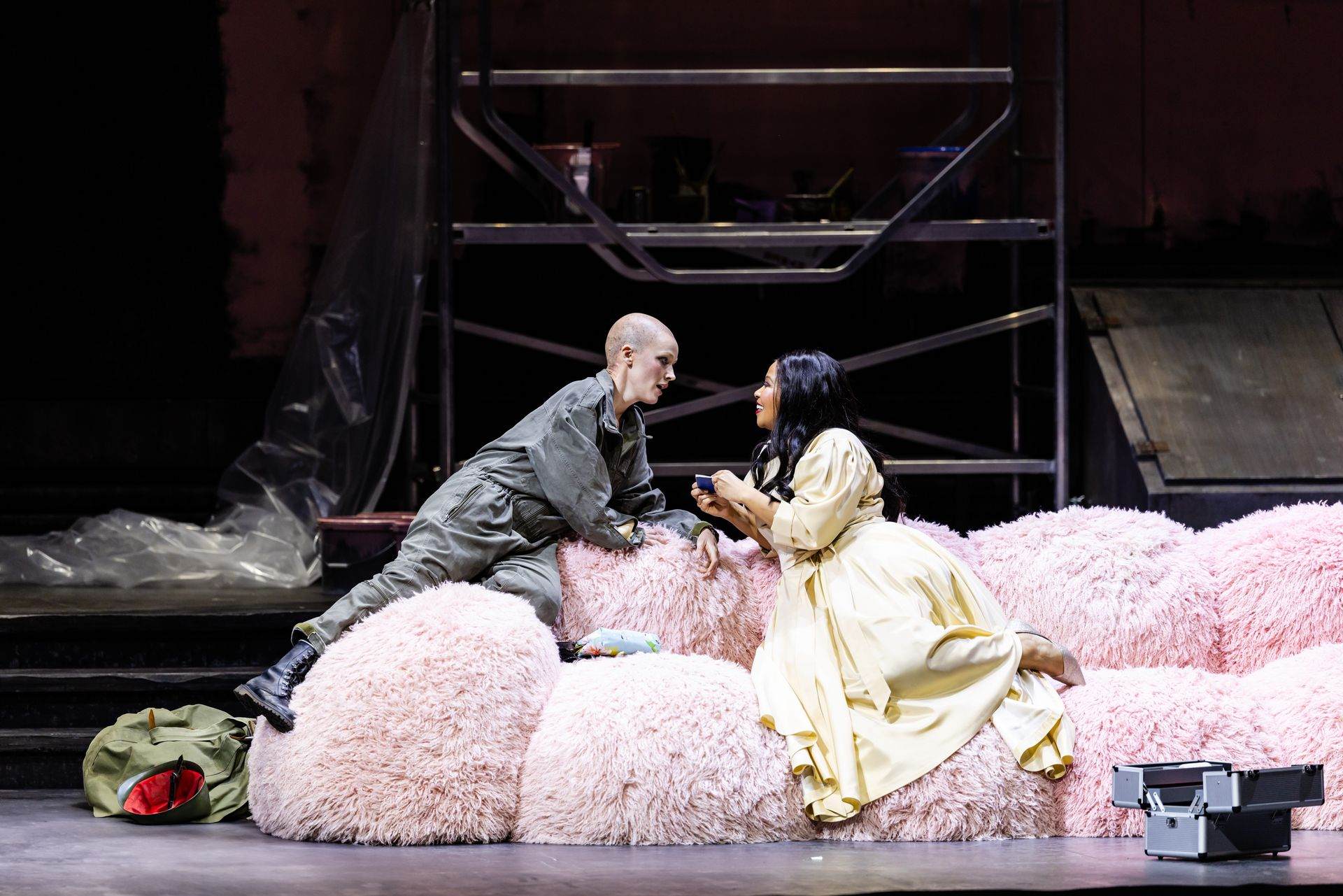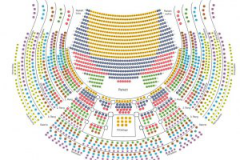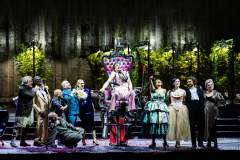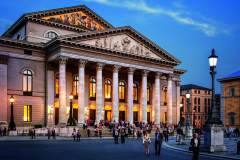The Marriage of Figaro
May 2026 | ||||||
|---|---|---|---|---|---|---|
Mo | Tu | We | Th | Fr | Sa | Su |
Composer Wolfgang Amadeus Mozart. Libretto by Lorenzo Da Ponte based on the comedy La Folle Journée ou Le Mariage de Figaro by Pierre-Augustin Caron de Beaumarchais..
Opera buffa in four acts (1786)
recommended from 16 years
In Italian. With German and English supertitles. New Production.
ABOUT
Count Almaviva has himself abolished the iusprimae noctis, or "right of the lord". A fact, however, which does not prevent him from trying to seduce the Countess’s maid, Susanna, just before her marriage to Figaro. A clear case of sexual harassment. But, what happens when the culprit has plenty of money and power? Or, can even bend the law to suit their wishes? Le nozze di Figaro was more than just a comedy back in Mozart’s day. The world portrayed is brim full of criminal machinations and blatant fraud and chicanery by the powerful and almighty. Lorenzo Da Ponte’s libretto based on the scandalous play by the French revolutionary, Beaumarchais, leads the colourful characters of a comedy of the classes into situations so hopeless that emptiness and the desire to die spread to all quarters. And so the Count’s love for his new wife following their marriage suddenly goes ice-cold, although he has just recently spectacularly freed her from the clutches of her custodian. The resourceful Figaro of all people had helped him here, and in gratitude, the Count now employs him as his personal valet, perhaps as questionable compensation for Susanna’s harassment. Hardly conquered, the countess finds herself neglected and longs for either Almaviva's love or her own death. It takes a great deal of intrigue and counter-intrigue to disempower the encroaching count and allow Susanna's wedding to her beloved Figaro to take place after all.
With much love for tempo and situation comedy, the staging by Evgeny Titov examines the question as to why humanity proves time and again how fragile it is and where the weak points are. For this, the immense versatility of Mozart’s music unfurls its very own dynamic in the unleashing of jealousy and desire.
PLOT
In the castle of Count Almaviva near Seville.
Act 1
It is the day of the wedding of Figaro, Count Almaviva's valet, and Susanna, the Countess's chambermaid. Susanna tells Figaro that the Count has an undisguised sexual interest in her and regrets having abolished the "gentleman's right" to the first night with a young bride. Figaro is forced to realise that his former friend Almaviva has become a rival who will abuse his power mercilessly. There is no time to lose, Figaro realises: the wedding must take place as soon as possible. Marcellina has her eye on Figaro. Supported by the lawyer Dr Bartolo, she insists on the fulfilment of a contract that guarantees her marriage to the much younger Figaro if he does not repay a sum of money on time. The deadline is today! The page Cherubino, the women's favourite, flutters around the castle like a butterfly, constantly on the lookout for new adventures. This is a thorn in the Count's side. When Cherubino gets him into an embarrassing situation, he banishes him from the castle and sends him to the army.
Act 2
The Countess is suffering because her husband has turned his back on her. Figaro has devised an intrigue to bring the Count down. At a night-time meeting, Cherubino, disguised as a woman, is to be brought to him. Susanna and the countess agree to help him after a slight hesitation. Just as they are transforming Cherubino into a woman, the Count bursts into the Countess's bedroom. Susanna helps the page to escape unnoticed through the window. Figaro insists that the wedding celebrations begin. Marcellina, Bartolo and the scheming music teacher Don Basilio burst in and insist on Figaro's marriage to Marcellina.
Act 3
The Countess turns Figaro's intrigue on its head: disguised as Susanna, she wants to seduce the Count in the garden at night. Susanna initially delivers the invitation verbally, and the Count is happily surprised. However, Susanna's confident remark to Figaro makes him suspicious. At the hastily arranged trial for the promissory note, it turns out that Figaro is the illegitimate son of Marcellina and Bartolo - another setback for the Count. The fact that Cherubino has not yet left the castle, contrary to his instructions, means a further loss of authority for Count Almaviva. The wedding feast begins in a very formal and cool atmosphere, and Marcellina and Bartolo are also married. Susanna secretly slips the Count an invitation to meet in the garden.
Act 4
When Figaro accidentally learns of the planned rendezvous between Susanna and the Count - he knows nothing about the dress swap - he is shocked. One by one, everyone arrives in the garden at night: Susanna, disguised as the Countess, the Countess in the robes of her chambermaid. Marcellina, who is convinced of her daughter-in-law's innocence, Cherubino, who stalks the countess in the belief that it is Susanna. Figaro and Susanna are reconciled. The Count is forced to realise that he has not been seeing Susanna, but his own wife, and that he has not witnessed an affair between Figaro and the Countess, but has been taught a lesson by the women. He implores the countess to forgive him. She does, because she loves him. Everyone tries to forget what has happened.
Program and cast
In Italian. With German and English supertitles. New Production.
Duration approximately 3 hours 30 minutes
Conductor: Patrick Hahn
Chorus: Franz Obermair
Il Conte di Almaviva: Gerald Finley
La Contessa di Almaviva: Diana Damrau
Susanna: Joélle Harvey
Figaro: Riccardo Fassi
Cherubino: Kate Lindsey
Marcellina: Juliane Banse
Bartolo: Martin Snell
Basilio: Tansel Akzeybek
Don Curzio: Kevin Conners
Barbarina: Iana Aivazian
Antonio: Roman Chabaranok
Due donne: Nontobeko BhenguLucy Altus
Bayerisches Staatsorchester
Chorus of the Bayerische Staatsoper
National Theatre Munich
The National Theatre Munich (German: Nationaltheater München) is an opera house in Max-Joseph-Platz in Munich, Germany. It is the home of the Bavarian State Opera and the Bayerisches Staatsballett(Bavarian State Ballet).
The Bavarian State Opera also performs in the Prinzregententheater, which opened in 1901 and, like the Bayreuth Festspielhaus, is built to Richard Wagner's specifications, and in the Cuvilliés Theatre at the Residenz, constructed in 1751–1753 and described by Thierry Beauvert as "a Rococo gem".
The Nationaltheater is very easy to get to both by car and by MVV public transportation.
By MVV public transportation
S-Bahn: S 1 - 8 Marienplatz
U-Bahn: U 3, 6 Marienplatz, U 3 - 6 Odeonsplatz
Bus: 52, 131 Marienplatz, 100 Odeonsplatz
Straßenbahn: 19 Nationaltheater
On the day of the performance, holders of regular tickets are entitled to use public transport provided by the Münchner Verkehrsverbund (MVV). This service starts at 3 pm respectively three hours before the performance commences and ends with the closing hour of the MVV.
By Car
Take the Altstadt-Ring to Maximilianstraße.
Parking garage Max-Joseph-Platz: open Monday to Sunday from 6:00 A.M. to 2:00 A.M.
You can take advantage of the special theatre parking fee of Euro 10,- from 6:00 P.M. to 8:00 A.M. by presenting your admission tickets.

 EN
EN DE
DE IT
IT FR
FR ES
ES RU
RU JP
JP RO
RO
 Seating plan
Seating plan 

